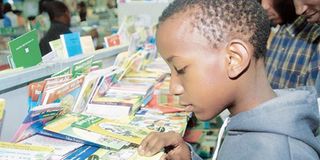Busting the myth: Kenyans read a lot

A young reader browses at city book store.
What you need to know:
- Though some cynics have been claiming otherwise, evidence on the ground suggests that Kenyans actually buy plenty of books
- Well written books by local authors and children’s books flying off the shelves
A young man in a casual outfit walks into Prestige Bookshop on Mama Ngina Street in Nairobi. He weaves his way through the shelves, touching the spines of books as though he is trying to pass a message to the glum yet inviting books on the shelves.
At the shelf marked ‘Motivational Books,’ he pauses and picks up two books: The Power of Positive Thinking by Norman Vincent Peale and The Outliers by Malcolm Gladwel. He walks to the cashier’s desk, hands Mr Protus Lijodi (the cashier) some money and waits as Mr Lijodi wraps the two books.
“You people should start offering discounts to regular customers like me,” he says. He is not complaining about the cost of the books. He already has 20 titles from the bookshop. He picks his sealed Prestige-branded envelope and walks out. No muss, no fuss.
In a space of 30 minutes, the human traffic in and out of the bookshop is constant and impressive. Mr Lijodi knows just how many books are sold at the bookshop — not less than 100 a day. Do the maths.
There has been a persistent notion that Kenyans do not read, that they only read when they have a compelling reason to.
Well, here is a reality check. We walked the streets, combed the bookshops within Nairobi, walked the narrow alleys in search of book lending stores and had a look at booksellers’ records.
We talked to book buyers, authors and literature lecturers. All of them said the same thing: Kenyans do read a lot.
The findings will disappoint the cynics and excite those who have secretly known that Kenyans were being judged harshly based on unsubstantiated assumptions.
Away from bookshops and publishing houses, there exist places where the public can obtain affordable books — a vibrant street book culture in Nairobi and many major towns in the country.
Street vendors sell both new and second-hand books. That these people exist tells of a reading culture in the country.
Mr Robert Irungu sells books on Kimathi Street in Nairobi. He has a palm size notebook where he notes his sales. He readily offered us the book for scrutiny.
Remarkable entries
The entries are remarkable. On July 17, he sold 16 books. On the list of books he sold that day are The Power of Money, The Forgotten Blessing, For God’s Sake Grow Up, The Constitution of Kenya, Essentials of Economics, Why Good People Mess Up, and Access Germany.
The list contains all kinds of texts. On July 20, he sold 17 books. He says the last days of the week are his busiest.
Across the street is a book lending store. The lady in charge confirms that books indeed move in and out.
From 2000 to date, writer Ng’ang’a Mbugua has published 10 books. His eleventh book will be out soon. He writes both for adults and children and for the decade that he has been writing, he only has kind words for the public.
“People read. They buy books. Those who say Kenyans do not read need to evaluate themselves. Take my book Different Colours that was published in 2011 for instance. All the copies of the first batch ran out in 2012 and I had to re-print another batch that, as we speak, have been sold out.”
Different Colours is a text at the University of Nairobi, Daystar University and Egerton University. So does this not give the book an advantage? He says it does though some of his other books move at an almost similar rate while other have done much better.
However, there was a curious finding from the excursion taken through the bookshops and street vendors. Books by Kenyan writers were ominously missing from the street vendors’ stalls and at the bookshops that we visited.
Ng’ang’a Mbugua says book sellers do not stock enough local books. If they do, then the books are displayed in some obscure part of the bookshop.
Prof Egara Kabaji of Masinde Muliro University agrees with Ng’ang’a.
“Out of keen observation over time, I have come to believe that Kenyans indeed do read. There are people who make simple statements about the reading culture in Kenya without offering any research backings for their statements. They mislead the public.
“If there are Kenyans who read a lot, then they are the children. Ask parents of young boys and girls. They cannot cope with the insatiable reading needs of their children. Publishers of children’s books can confirm this.”
He has his own categories of Kenyan readers. Motivation and inspirational book readers look for books on how to better themselves. Lovers of creative literature go for fiction books. Classroom text readers read because the books are recommended by their colleges or schools. Bible or spiritual books readers go for the Bible and anything spiritual.
He calls the last category the “appearance readers”, who buy books only to be seen as readers. His list, however, leaves out readers of health and lifestyle, biographies, memoirs and travel books.
Street vendor Elisha Gachura only stocks religious and spiritual books. He says regardless of the slightly higher cost of religious books, people still stop by his stall, near Bus Station in Nairobi, to buy the books. In a week, he sells over 60 per cent of the books he has on offer.
Another street vendor who has been selling books since the early 1980s says that during the Moi era, Kenyans loved to buy books. An individual would walk to him and pick even six books and pay for them on the spot. He says the sales slumped for some time, but over the years things have gotten better.




